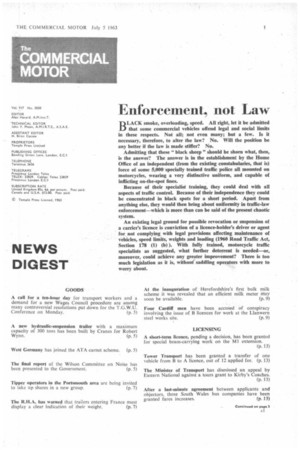Enforcement, not Law
Page 3

If you've noticed an error in this article please click here to report it so we can fix it.
DI LACK smoke, overloading, speed. All right, let it be admitted that some commercial vehicles offend legal and social limits in these respects. Not all; not even many; but a few. Is it necessary, therefore, to alter the law? No. Will the position be any better if the law is made stiffer? No.
Admitting that these black sheep" should be shorn what, then, is the answer? The answer is in the establishment by the Home Office of an independent (from the existing constabularies, that is) force of some 5,000 specially trained traffic police all mounted on motorcycles, wearing a very distinctive uniform, and capable of inflicting on-the-spot fines.
Because of their specialist training, they could deal with all aspects of traffic control. Because of their independence they could be concentrated in black spots for a short period. Apart from anything else, they would then bring about uniformity in traffic-law enforcement—which is more than can be said of the present chaotic system.
An existing legal ground for possible revocation or suspension of a carrier's licence is conviction of a licence-holder's driver or agent for not complying with legal provisions affecting maintenance of vehicles, speed limits, weights and loading (1960 Road Traffic Act, Section 178 (1) (b) ). With fully trained, motorcycle traffic specialists as suggested, what further deterrent is needed—or, moreover, could achieve any greater improvement? There is too much legislation as it is, without saddling operators with more to worry about.












































































































